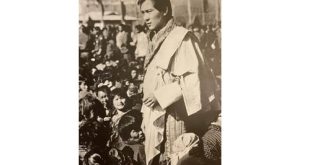The Bhutan Stroke Foundation (BSF), in collaboration with Think Locally, Act Globally (TLAG) from Japan, has introduced a new initiative to explore the integration of agricultural activities into stroke rehabilitation in Bhutan.
The initiative aims to study how engaging stroke survivors in structured farming tasks can support both physical and psychological recovery. The initiative emphasizes the potential of Bhutan’s traditional farming practices and tools as culturally appropriate, low-cost and sustainable therapeutic interventions.
By drawing from familiar techniques such as soil preparation, basic tool handling, planting, and small-scale harvesting, the approach aims to support both physical and emotional healing for stroke survivors.
BSF and TLAG believe that these activities can improve recovery outcomes while promoting community-based rehabilitation, particularly for stroke survivors in rural areas who may not have access to specialized therapy facilities.
The model seeks to use Bhutan’s strong relationship with land and agriculture to create a rehabilitation method that is both practical and meaningful for survivors.
Dawa Tshering, Executive Director of the Bhutan Stroke Foundation, stated that agricultural therapy is part of an ongoing pilot project. He said, “Agriculture therapy is not limited to farming alone; it also involves adapting traditional farm tools and simple agricultural tasks as therapeutic aids for stroke survivors, especially in rural communities.”
This paper reached out to Dr. Tashi Tenzin, neurosurgeon and chairman of the BSF Technical Advisory Committee, for his expert view on the potential of agriculture therapy in stroke rehabilitation.
According to his assessment, agriculture-based activities have strong potential to aid both the physical and emotional rehabilitation of Bhutanese stroke survivors. Simple farming tasks, like planting, watering, weeding and harvesting, offer a calm, familiar environment where survivors can work on improving their balance, coordination and fine-motor movements.
He said, “Over time, improvements may be seen in muscle strength, hand function, mobility, and endurance. Emotionally, working with soil and plants provides a calming, grounding experience that can reduce stress, anxiety, and feelings of isolation.”
The strong cultural connection to farming in Bhutan also allows survivors to regain a sense of identity and purpose.
“As confidence grows, participants may show increased motivation, better mood, improved social interaction, and a stronger sense of independence,” he added.
Dr. Sonam Yoezer, key speaker and member of the BSF Technical Advisory Committee, highlighted that while the concept is encouraging, safety must remain the foremost concern.
He explained that these activities should take place under proper supervision, ideally with support from a medical team trained to prevent injuries, reduce the risk of falls, and respond quickly in the unlikely event of another stroke. He said, “To explore this idea in Bhutan, we can begin with a small pilot project involving a few stable and moderately functional patients.”
He noted that such a pilot would help determine how patients respond to the program, how well they accept it, and what benefits it may provide. “If the results are positive, agriculture therapy could eventually be adapted and expanded as part of a broader national rehabilitation strategy.”
Ryohei Hachiya, Physiotherapist at Paro Hospital and a JICA volunteer, explained that agricultural rehabilitation offers significant promise for stroke survivors. He noted that farming activities are especially useful for strengthening upper limb function, as they naturally engage both gross and fine motor skills.
He said that emotionally, the ability to contribute to household work and regain a meaningful role within the family can help sustain confidence and motivation. Stroke affects not only the body but also the mind, and such engagement can play an important part in rebuilding independence.
“The expected benefits are not limited to physical and psychological aspects, but also extend to economic outcomes and the preservation of local culture,” he added.
The Physiotherapist mentioned that while Bhutan Stroke Foundation has reported improvements among participants, he cautioned that objective evidence is still needed to confirm which functions improved and how significantly. He said, “Even in Japan, this field remains at the research stage. For this reason, we regard it as our next step to verify the effects through before-and-after video comparisons and the use of standardized quantitative outcome measures.”
Michio Kojima, Director of TLAG shared the organization’s commitment to sustaining this initiative as it expands in Bhutan. He emphasized that their support will continue for as long as it is needed, stating, “As long as stroke survivors need support, we will support.”
The pilot project demonstrates how innovative approaches like agriculture therapy can bridge gaps in rural healthcare, offering stroke survivors a chance to regain independence.
 The Bhutanese Leading the way.
The Bhutanese Leading the way.




